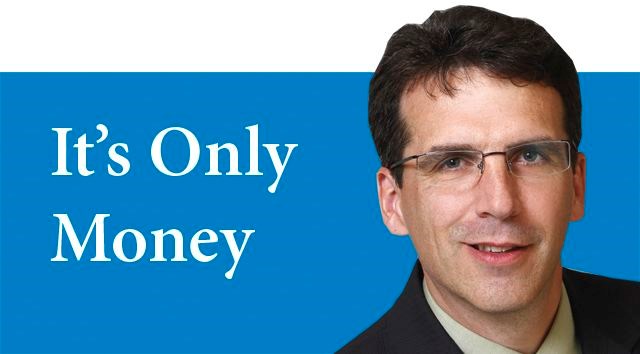If I recall the names correctly, there were Babies, Daddies, and Steelies. A Baby was a small glass marble, and it took three of them to trade for a Daddy, a larger glass marble. A Steely was also a larger piece, but it was made of steel. The bigger, heavier ones were worth more in part because they were more effective in the sport, where competition potentially resulted in keepsies of the loser's marbles. So, while there was trading, the main idea was the sport itself.
If, on occasion, a player ran out of marbles because he kept losing, he might beg for a marble or two from the guy with the big sack of the semi-precious orbs. He was, of course, at the mercy of his competitor. I think I might recall a kid giving me my first handful or marbles, because he wanted more competitors in the game and I had nothing.
I guess walking around with a pocket full of little glass balls, and nobody to play with is not very fun - and a bit weird.
The going rate for vacuuming the house and cutting the grass at my house was 25 cents, and no matter how hard I begged, my mom would not grant me a raise - nor an allowance. What the heck is an allowance? There was no pay for nose-picking, begging or crying at my house. The thing is, I really looked forward to spending my pay on a bag of chips and a pop, which was 25 cents combined. But this particular week I wanted marbles and chips and pop, so I approached mom and said: "Look, I'm going to need a raise. You don't expect me to survive on 25 cents do you? I have needs."
Frankly, it was probably more than principle to her. I don't think she had an extra quarter. I was out of luck, and no amount of a nine year-old boy's economic sophistry was going to change that.
Now, 46 years later, with a business degree and 28 years in finance on my resume, the idea of chips and pop, and a quick game of marbles out in the grass sounds pretty sweet. And I would gladly cut the grass with a pair of scissors if I could play with a grandchild for an hour. I might even spot the kid a couple of marbles.
But there are two sides to every transaction, whether it be marbles, or chores, and, if the market is efficient, prices will settle somewhere that spreads the pain of compromise around about right, with occasional imbalances in the ebb and flow of things. Back then I imagined two burley men in uniform descending upon my unsuspecting mother, demanding that she pay enough for family chores so that my needs could be met, but in truth, if I wanted more, I had to go get it somewhere else.
And I did.
The politically-impartial Bank of Canada recently published a paper on the impact of minimum wage legislation on the overall Canadian economy.
Excerpts from its summary suggest that the measures contemplated by various provincial governments, while well-intended, will actually shrink employment slightly, as well as the overall economy. If mom doesn't have an extra quarter, something has to give if some external force tries to force the issue.
The Bank of Canada study says:
"... the scheduled (minimum wage) increases would reduce the level of real gross domestic product (GDP) by roughly 0.1 per cent by early 2019, while boosting CPI inflation by about 0.1 pp.
"The increases in the minimum wage lead to higher real wages, which push up firms' marginal costs, and thus inflation increases accordingly..."
"Weaker labour demand leads to reduced employment and lower hours worked, although the net impact on labour income is positive. Employment losses amount to about 60,000 workers (hours worked decline by 0.3 per cent), a number that lies in the lower part of the range obtained from a simple accounting exercise (30,000 to 140,000)."
"Consumption would be reduced slightly as the higher inflation would elicit a slight interest rate increase, which would more than offset the higher labour income."
In so many words, the proposed wage increases will benefit the employees lucky enough to get it, of course, but the outcome will probably result in fewer overall jobs, and a slightly smaller economy.
This is not to say it's right. It's just true. And it's too easy to just blame it on greed. It's called the job market for a reason - it's a market place, not a school lunch cafeteria. We are fully aware that this is a lot more serious than a pocket full of marbles and a bag of chips.
So let's hope that most of the job losses are largely absorbed by middle class youth, who will have to wait a few weeks longer to buy that electronic gadget, instead of those who have nowhere else to go, and no other means to provide the basic necessities of life.
Mark Ryan is an Investment Advisor with RBC Dominion Securities Inc. (Member-Canadian Investor Protection Fund), and these are Mark's views, and not those of RBC Dominion Securities. This article is for information purposes only. Please consult with a professional advisor before taking any action based on information in this article. Mark can be reached at [email protected].



